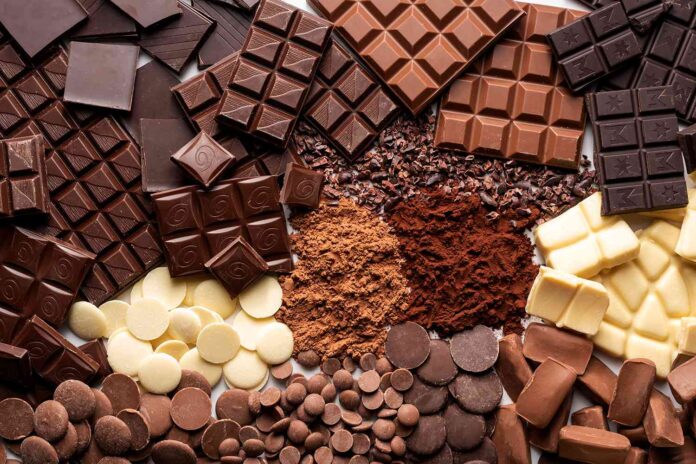A recent study conducted by the strategic consulting and market research firm, BlueWeave Consulting, revealed that the Asia-Pacific Cocoa and Chocolate Market was worth USD 9.14 billion in the year 2021. The market is projected to grow at a CAGR of 4.6%, earning revenues of around USD 12.45 billion by the end of 2028. The Asia Pacific Cocoa and Chocolate Market is booming because Dark and sugar-free chocolates are becoming increasingly popular among consumers. Because nowadays customers are aware of the benefits of dark chocolate, they have developed a liking for it. Organic ingredients are now being used by chocolate manufacturers. Also, to attract customers, numerous chocolate manufacturers have produced functional chocolates including prebiotic elements and vitamins. As a result, rising chocolate demand is a major driver of cocoa demand in the Asia-Pacific cocoa industry. However, fluctuation in cocoa prices may act as a huge restraining factor for market growth.
Growing Awareness of Dark Chocolate Benefits
Cocoa-based chocolate is high in antioxidants and minerals. Chocolate is also high in calories, so eating it in moderation can help you manage your weight. Chocolate consumption decreases cholesterol levels and lessens the risk of cardiovascular issues. Furthermore, due to its aroma and flavor, chocolate has been regarded as a luxury or premium product since ancient times. All of the aforementioned health benefits and consumer perceptions of chocolate are predicted to increase. Moreover, organic ingredients are increasingly being used by chocolate manufacturers. Consumer tastes, lifestyles, eating habits, and exposure to international brands have all contributed to increased sales in the Asia-Pacific chocolate sector. The Asia-Pacific chocolate industry is increasingly dominated by international brands.
Premium Chocolates are becoming Increasingly Popular
Chocolate is viewed as an exotic pleasure by Asian customers in China, India, Japan, and other countries. It can be offered as a luxury gift or consumed on a special occasion. The market for premium chocolate is expected to benefit from growing sales of ordinary chocolate. The bean-to-bar concept, which predicts that consumers will regard premium chocolate with a higher cocoa content as a luxury rather than a need, is expected to boost demand. The Indian market for premium chocolates is dominated by fierce regional and global competition. As a result, international firms are always producing new things to differentiate themselves from their competition. As a result, the Asia-Pacific Cocoa and Chocolate Market are predicted to develop at a significant rate during the forecast period (2022-2028).
Request for Sample Report @ https://www.blueweaveconsulting.com/report/asia-pacific-cocoa-and-chocolate-market/report-sample
Volatile Prices of Cocoa
The market’s growth is hampered by unstable cocoa prices and limited production. Products made from cocoa, such as dark chocolate, cacao nibs, and unsweetened cocoa powder, are rich in minerals. Raw cacao goods that have had minimal processing have more antioxidants and less added sugar than those that have undergone extensive processing, which limits the market growth. These factors collectively prevent the Asia-Pacific Cocoa and Chocolate Market from expanding.
Segmental Coverage
Asia-Pacific Cocoa and Chocolate Market – By Applications
Based on applications, the Asia-Pacific Cocoa and Chocolate Market is segmented into Cosmetics, Pharmaceuticals, Food and Beverages, and Confectionary. The food and beverages segment now has the biggest market share and is likely to continue to do so during the forecast period (2022-2028). For many years, chocolate has been the most popular sweet utilized in a variety of contexts. It has been used in baking frequently as compound chocolate, a less expensive substitute for pure chocolate made of cocoa vegetable oil and sugars. Additionally, brownies, cakes, creams, mousses, and even for decorative purposes are made with milk, dark, and white chocolate. Additionally, the usage of chocolate in beverages has increased. Trendy options include various healthy chocolate cocktails and hot chocolate. The major purposes of chocolate in beverages are to improve flavor, increase richness, and provide color. Many beverage makers use chocolate as their major ingredient because of its ability to hide flavors, keep a clean label, and possess antioxidant properties.
Impact of COVID-19 on Asia-Pacific Cocoa and Chocolate Market
The cocoa market was affected by low sales volumes caused by the COVID-19 epidemic, as well as supply-side worries over quality and certification. The Fine Cacao & Chocolate Institute (FCCI) conducted a poll to determine the impact of the COVID-19 pandemic on exports, and the findings were alarming. According to studies, the rigorous lockdown prevented producers and agricultural workers from accessing the estates for several weeks until officials granted exceptions. Because of the disruption in the raw material supply chain, which was followed by the lockdown, an increasing number of specialized stores are closing for an extended period, and the volume consumption of luxury chocolates has decreased.
Competitive Landscape
The leading market players in the Asia-Pacific Cocoa and Chocolate Market are Nestle S.A, Cargill Incorporated, Olam International, Barry Callebaut AG, Fuji Oil Company Ltd, ECOM Agroindustrial Corporation, Touton S.A, B D Associates Ghana, PLOT Enterprises, and other prominent players. The Asia-Pacific Cocoa and Chocolate Market is highly fragmented with the presence of several manufacturing companies in the country. The market leaders retain their supremacy by spending on research and development, incorporating cutting-edge technology into their goods, and releasing upgraded items for customers. Various tactics, including strategic alliances, agreements, mergers, and partnerships, are used.
Contact Us:
BlueWeave Research Blog
Phone No: +1 866 658 6826
Email: info@blueweaveconsulting.com














